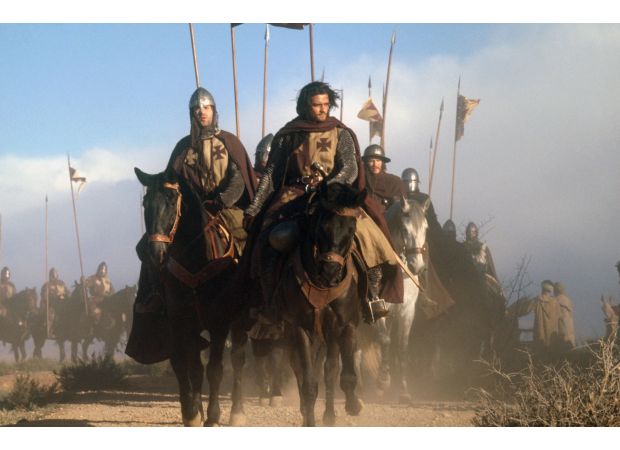The 2005 film Kingdom of Heaven, directed by Ridley Scott, is considered a better movie than Gladiator.
This movie excels in all aspects compared to Gladiator, except for the protagonist.

When it comes to epic historical films, Kingdom of Heaven should be considered one of the greatest. Just like how citizens in ancient Rome would flock to the Colosseum, modern audiences are once again filling up theaters to witness the latest masterpiece from Sir Ridley Scott, this time about the valiant Gladiators. The first installment, released in 2000 and starring the talented Russell Crowe, not only achieved incredible commercial success but also sparked a resurgence of epic historical films in Hollywood during the early 2000s. Within just four years, we were blessed with the likes of Troy, Alexander, and The Last Samurai.
Fast forward to present times, and Gladiator II has successfully replicated the formula of its predecessor, well on its way to dominating the box office. For those who have a deep fascination with the Roman Empire, this is the ultimate reward - another grand-scale historical blockbuster that transports us back to that era over 20 years ago.
The original Gladiator, starring the dashing Russell Crowe, was a cinematic triumph that captured the hearts of audiences worldwide. However, after over a decade dominated by superhero movies, the once-powerful grip that epic historical films had on the 2000s now feels like a distant memory. While some of these films have stood the test of time, others have faded into obscurity. If titles like Exodus: Gods and Kings, the Ben Hur remake, or The Eagle don't ring a bell, it's because these films were unable to find an audience after the initial boom.
But amidst this period of forgetfulness, there is one film that stands out in this writer's mind as the pinnacle of epic historical films - dare I say, it is even superior to Gladiator. Released in 2005, Kingdom of Heaven tells the sweeping tale of the 12th-century Christian Crusaders' valiant efforts to defend the First Kingdom of Jerusalem from the forces of Saladin and his Muslim army. The film stars the dashing Orlando Bloom as Balian, who is discovered by his father Godfrey and brought to Jerusalem to join in the fight.
All the ingredients for a box office hit were present - a deserving big budget to tell the story of one of the most poetic and tragic periods in human history, a talented cast including recognized faces of the era, and the mastermind behind the resurgence of epic historical films, Sir Ridley Scott himself at the helm. However, despite all this, the film, with its $130 million budget, failed to make a significant impact. A strange marketing strategy that marketed the film as an action-packed epic, coupled with a poorly received theatrical release, kept many viewers away. Even to this day, the film has not gained the recognition it deserves, despite a much higher-rated Director's Cut that was released shortly after.
Of course, the film has its flaws, and critics at the time were quick to point them out. Bloom, for all his breathtaking good looks, was unable to captivate the audience's attention like Russell Crowe did in the original Gladiator, or like Viggo Mortensen's Aragon, or even Peter O'Toole's Lawrence of Arabia from the golden age of epic films. But to be fair, Bloom's character had little to work with, as the script failed to develop him beyond a brief struggle with his wife's death. He was stoic, but not very interesting.
Another issue was with the theatrical version of the film. Sir Ridley is known for his disdain towards the restrictions imposed by film studios and has often released Director's Cuts to expand his movies. In the case of Kingdom of Heaven, the theatrical version was still great, but the Director's Cut was a massive step forward in terms of plot and character development, leaving viewers intensely frustrated with the studio's decision to release the theatrical version. Even Bloom's Balian was vastly improved in the Director's Cut.
But despite its flaws and the context behind its poor box office performance, we are here to highlight just how extraordinary Kingdom of Heaven truly is. Every frame of this film is akin to a work of art - the cinematography, setting, and color grading are the masterpieces of skilled artists at the top of their game. Finding the perfect balance between realism and dreamlike fantasy, which was executed so brilliantly in Gladiator, watching this film on the big screen is the epitome of a cinematic experience. Whether it's the cool blue hues of medieval France or the warm golden sands of the Levant, each region is beautifully brought to life, with production design that makes every set feel genuinely lived in.
What sets this film apart from Gladiator is that very few Hollywood movies have managed to capture this specific time period and location with such authenticity. The 1935 film The Crusades now feels like a costume party, and even the iconic 1963 Arabic film Saladin the Victorious was unable to fully realize the grandeur of the era due to budget constraints. This is a shame because the Islamic Empire played a significant role in shaping global culture during the Middle Ages, and its philosophical and technological advancements are rarely celebrated in cinema.
The Kingdom of Heaven, a historical epic that has captivated audiences and ranks among the very best in its genre, has once again filled cinemas with viewers eager to witness Sir Ridley Scott's latest masterpiece. It all started in 2000 with the release of Gladiator, starring the talented Russell Crowe, which not only became a commercial success but also ignited a resurgence of large-scale historical epics in Hollywood. From Troy to Alexander and The Last Samurai, these epic films transported us back in time and captured the attention of history enthusiasts worldwide.
Fast forward to the present, and we find ourselves eagerly anticipating Gladiator II, which has followed in the footsteps of its predecessor and is on its way to becoming another box office hit. For those who find themselves constantly thinking about the Roman Empire, this film is a rewarding experience that takes us back to that golden era of epic cinema that was two decades ago. There's no denying that Gladiator set the bar high, but the Kingdom of Heaven has proven to be a worthy contender – some might even say it surpasses its predecessor.
However, the fall of the historical epic came as no surprise after over a decade dominated by superhero films. The once-popular genre seemed to have faded into obscurity, with some films standing the test of time while others were quickly forgotten. Titles like Exodus: Gods and Kings, the Ben Hur remake, and The Eagle may not ring a bell for many, as these films failed to find an audience after the initial boom.
But lost in the memory of that period – at least in this writer's opinion – is the pinnacle of the historical epic, which some might argue is even superior to Gladiator. Kingdom of Heaven, released in 2005, tells the sweeping tale of the Christian Crusaders' struggle against Saladin and his Muslim army to save the First Kingdom of Jerusalem in the 12th century. Starring the dashing Orlando Bloom as Balian, who is taken under the wing of his father Godfrey of Ibelin and brought to Jerusalem to defend it, this film had all the elements for a blockbuster hit.
A big-budget retelling of the Crusades, Kingdom of Heaven boasted a talented cast featuring the likes of David Thewlis, Orlando Bloom, Jouko Ahola, and Liam Neeson. And with the renowned Ridley Scott at the helm, expectations were high for this film to be a major success. However, despite its $130 million budget, the movie failed to impress viewers due to a bizarre marketing strategy that portrayed it as an action-packed epic and a poorly received theatrical cut release. As a result, it never gained the following it deserved, despite the much higher-rated Director's Cut that was released shortly after.
Critics at the time did not hold back in pointing out the film's flaws. Bloom, although undeniably handsome, could not capture the audience's attention like Russell Crowe did in Gladiator or Viggo Mortensen in The Lord of the Rings. Even compared to classic epics like Lawrence of Arabia, Bloom's portrayal of Balian fell short, not helped by a script that left little room for character development. The story itself was fascinatingly complex, but the protagonist's journey was lacking, making him a somewhat uninteresting character.
Furthermore, the theatrical version of Kingdom of Heaven did not do the film justice. Ridley Scott is known for disliking studio interference and has often released Director's Cuts to fully realize his vision. The Director's Cut of Kingdom of Heaven is a major improvement, with a more intricate plot and deeper character development. Even Bloom's performance as Balian is vastly improved in this version, leaving viewers wondering why the studio executives approved the theatrical cut.
Despite its faults, Kingdom of Heaven is a cinematic gem that demands recognition. Each frame of the film is a breathtaking work of art, with stunning cinematography, beautiful settings, and masterful color grading. It strikes the perfect balance between realistic and dreamlike, much like Gladiator, making it a visual feast that is best experienced on the big screen. From the frosty blue hues of medieval France to the golden sand dunes of the Levant, each location is meticulously crafted, adding to the film's authentic feel.
What sets Kingdom of Heaven apart from Gladiator and other historical epics is its unique portrayal of this period in history. Few Hollywood films have ever brought the Islamic Empire and the Crusader Kingdom to life in such a captivating way. Previous films like the 1935 The Crusades now feel outdated and more like a costume party, while the 1963 Egyptian film Saladin the Victorious, although iconic in Arabic cinema, lacked the budget to fully realize the era. This is a shame, as the Islamic Empire played a significant role in shaping global culture during the Middle Ages, and its contributions are not often celebrated in cinema.
In conclusion, Kingdom of Heaven is a cinematic masterpiece that deserves more recognition and appreciation. Despite its initial failure, it remains a must-watch for any lover of historical epics, transporting us back in time to a period of grandeur and turmoil. With its stunning visuals, talented cast, and captivating storytelling, it is a film that will leave a lasting impression on any viewer.






